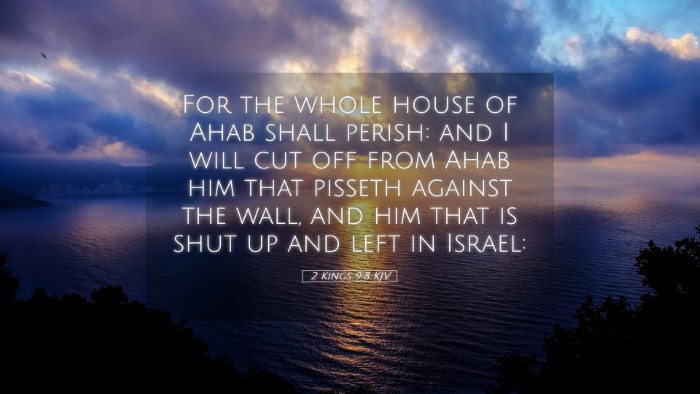Commentary on 2 Kings 9:8
2 Kings 9:8 states: "For the whole house of Ahab shall perish: and I will cut off from Ahab him that pisseth against the wall, and him that is shut up and left in Israel." This proclamation by the Lord through the prophet Elisha signifies a critical turning point in the history of Israel, targeting Ahab’s lineage and the evil influence he represented.
Contextual Analysis
The context of this verse emerges as part of the larger narrative of God's judgment against the house of Ahab. Ahab, known for his wickedness, including the worship of Baal, represents moral and spiritual decay in Israel. The prophetic message delivered to Jehu is a direct response to the idolatry and bloodshed associated with Ahab's rule.
Historical Background
Understanding the historical context is essential. Ahab, influenced by his wife Jezebel, led Israel into significant idolatry and sin, forsaking the covenant with God. The phrase "him that pisseth against the wall" refers to males, particularly indicating that God was determined to eliminate all male descendants of Ahab, regardless of their social status or their being shut up in the privacy of the royal palace.
Theological Themes
-
Judgment and Sovereignty:
This verse underlines God’s sovereignty in judging nations and individuals for their actions. The destruction of Ahab’s house was preordained due to their persistent rebellion against God.
-
Divine Justice:
God’s justice is profoundly emphasized here. The phrase “cut off” indicates a total and irrevocable severance from life, a theme that reverberates throughout the scriptures regarding divine retribution upon the unjust.
-
Symbolism of "the Wall":
The specific mention of “pisseth against the wall” accentuates the completeness of God’s judgment, symbolizing that no one among Ahab’s lineage shall escape the consequences of his actions, reflecting the gravity of sin and its repercussions.
Commentary Insights
Matthew Henry's Commentary
Henry emphasizes the inevitability of divine judgment upon Ahab’s house, noting that God’s sentence was consistent with His previous declarations through prophetic voices. He asserts that God is deeply offended by idolatry and bloodshed, and thus, a complete extermination of those who promoted wickedness becomes necessary.
Albert Barnes' Notes
Barnes highlights that the judgment is not merely upon Ahab personally but extends to his entire household. He interprets the phrase “him that pisseth against the wall” as an idiom indicating all male descendants. This reflects the severity of God’s displeasure with generational sin and its consequences. Furthermore, Barnes points out that the complete annihilation serves as a warning for those in leadership who lead others away from righteousness.
Adam Clarke's Commentary
Clarke discusses the cultural and social implications of the phrase by noting that in ancient Israelite society, a man’s lineage was critical to his standing and legacy. The totality of the judgment signifies the end of Ahab's corrupted legacy. Clarke's observation leads readers to consider the weight of delivering judgment that not only affects Ahab but his entire family, thus underlining the cumulative impact of sin.
Applications for Today
While this text is grounded in a historical context, its implications resonate today, especially in pastoral care and theological education:
-
Understanding God’s Holiness:
Modern readers are reminded that God is unchanging and His stance against sin endures. Understanding this holiness prompts a deeper reverence and pursuit of righteousness.
-
Generational Responsibility:
The consequences of sin can extend beyond the individual, necessitating a focus on teaching future generations the importance of faithfulness to God.
-
Importance of Prophetic Voices:
The role of the prophet in proclaiming God’s truth remains vital. Just as Elisha communicated God's intentions, so too must contemporary leaders remind their communities of divine accountability.
Conclusion
The proclamation of judgment on the house of Ahab in 2 Kings 9:8 serves as a profound reminder of God’s justice and holiness. Through insights from various public domain commentaries, the verse offers a deep reflection on God’s character, the seriousness of sin, and the unwavering nature of divine judgment. It calls upon pastors, students, and scholars alike to contemplate the weighty implications of leadership, accountability, and the enduring consequences of turning away from God.


